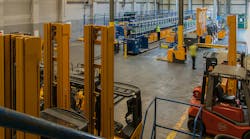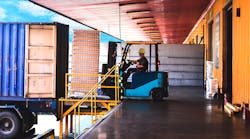The word "sustainability" has been redefined by "special interests" to be synonymous with "green." And even green has been changed from a color to a movement. But as a concept, sustainability deserves better than to be tossed aside for being irrelevant to your company's day-to-day viability—because that's what sustainability is really about: endurance.
The endurance of U.S. manufacturing has been in question for the last few years, but recent industry trends make me feel hopeful—with enough concern left over to keep that hope from hatching into exuberance. You may have gotten that impression of our mixed feelings from MH&L's April cover art, depicting a manager's hands trying to protect his business's productivity from seemingly unmanageable elements. That's your life, and that's why we devoted this edition of MH&L to sustainability strategies.
In preparing it, one of our contacts was Patrick Van den Bossche, partner and practice leader at A.T. Kearney's Americas operations. He's a manufacturing expert who has worked with your colleagues in the consumer products, automotive, energy, food and beverage, retail and chemical industries. He had a lot to say about Walmart's recent commitment to source $50 billion worth of goods in the U.S. over the next ten years. Like us, he has mixed feelings about the present supply chain environment.
While reshoring is a great opportunity for U.S. businesses, the question is whether these companies are ready for it. Many have laid-off a good chunk of their workforce, and bringing that force back won't be easy as turning on a power switch. Our new reality includes a growing labor shortage. For that Van den Bossche blames the combination of young kids not being interested in STEM-type careers (science, technology, engineering and mathematics) and therefore an insufficient supply of talent to fill the void being left by our rapidly-retiring workforce survivors.
"Companies have significantly underinvested in their assets in the U.S., as they were rerouting capital to lower-cost locations, so basically a lot of the U.S. plants are outdated and not very well performing," he told us. "Getting productivity levels up to standard will therefore require a lot of investment in improving maintenance and/or a lot of capital to replace assets that can no longer be made competitive."
Those assets include both equipment and labor. One of our go-to contacts when we want to gauge the industrial talent pool is Jim Shephard, president of Shephard's Industrial Training Systems and a member of MH&L's editorial advisory board. He specializes in matching people skills to a work environment. As an industrial trainer, he's concerned about the ability of already-stressed companies to take on another responsibility: education.
"Our education system has not prepared our present and upcoming workforce to meet industry demands," Shephard says. "Conducting a training session a few days ago, I overheard this comment from a facility manager: ‘Where can I find people who know how to work?' He did not say want to work, he said, know how to work. This manager is finding out the hard way that training is now his responsibility. Basic work habits are not being trained at an early age, therefore our workforce, when they become adults, are far from what is needed to meet entry level demands."
This is a true environmental sustainability issue, and it affects whole supply chains. An under-prepared worker can compromise safety at one site, but the lost productivity at that site also affects the ability to both accept and prepare shipments elsewhere. In an era of minimum inventory and just-in-time expectations, one overturned forklift can send shockwaves up and down a supply chain—and devastate families when injury and death enter in.
You do have the ability to sustain your environment. The question is, do you have the power? If it's not assigned to you, you may have to take charge of it for your career's sake.
Follow me on Twitter @TomAndel.


